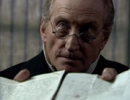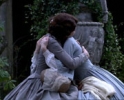The Gun of Death
Learning that the BBC had decided to schedule Bleak House like a soap had got me thinking. There’s two schools of thought on Dickens and his fellow famous British writers. One is that if they were alive today, they’d damn well be writing for television, and what’s more, writing really good television. The other is that they achieved something far greater than anyone today is likely to ever achieve, and that they should be held on a lofty pedestal, and studied in exactly the sort of university courses that the people who take this view never attended in their life.1
Me, I like the former view, and it’s good to see people putting their money where their mouth is and actually having the nerve to make, and program, Dickens in this way. Bleak House is probably a fantastic book, and I’ll be reading it straight after the adaptation is over.2 But there’s no doubt that in terms of genre, it’s a bit of a soapie.
soap op ▪ er ▪ a
noun
a television or radio drama series dealing typically with daily events in the lives of the same group of characters. So named because such serials were originally sponsored by soap manufacturers.
Bleak House is indeed dealing with a world that often seems to consist of only around 30 people, who keep improbably bumping into each other. People have exploded, people have suddenly caught illnesses, and this week, people meet their long-lost daughters. The difference between this and Neighbours? Firstly, the clothes and backgrounds are prettier. More importantly, it’s well written and planned, by virtue of not being produced at a pace more suitable for sausages than drama.
Enough of this waffle. Let’s look at this fortnight’s episodes. Having found a kind soul by the name of lilycup who screencapped the episodes, the quality of the pictures has gone up somewhat.
Week Five. Adjusting to old-fashioned values is tricky. Jarndyce is such a nice man, but I feel a little icky at the thought of him marrying Esther. The scene with him getting all embarrassed in the carriage almost sold me on it though. But while Jarndyce is awkwardly attempting to make Esther understand his true feelings, Lady Dedlock has discovered her daughter is still alive, and comes to her, explains that she’s the daughter of her and Mr Nemo (aka Captain Hawdon), and that they can never see each other again. Textbook parenting, really.
Guppy manages to completely screw up this week. Wandering blithely in to try to collect the love letters, he simply makes it easier for Smallweed to find them, and hand them over to Tulkinghorn. It does however lead to an awesome moment as he turns to leave and finds the despicable man standing over him like some kind of devil.
Week Six. Oh poor Jarndyce. All thoughts of icky are gone. In perfectly played scenes by Denis Lawson, he proposes to Esther — and is accepted — and then asks to keep it quiet the next day, having suddenly been hit by an attack of the guilts at trying to pick up a girl so much younger than him when she might still have prospects. See, this is why the nice guys never get the girl. They’re just not selfish enough. Of course, Guppy turns out to be a little too selfish; upon seeing Esther’s skin condition, he does a complete U-turn.
Richard’s obsession with the court case was picking up last week but now things get really disturbing. Skimpole may be naive, but he’s also curiously good at picking up money from suckers, or at least helping his friend the creepy, slow-talking lawyer do it. Poor cute little Ada pledges her fortune to allow him to keep going in the army and forget about Jarndyce and Jarndyce, which he’s willing to agree to, on the condition that he continue with Jarndyce and Jarndyce and quit the army. Ada’s now stuck with a useless fiancee and friends who can see that he’s useless, so she’s started getting a bit disagreeable, as you do.
Perhaps the best scene so far comes when almost all the cast gathers around the poor young boy Jo as he dies. Anna Maxwell Martin is adorably noble as she tries to lead him in prayers, and heartbreakingly he only manages a few words before shuffling off the mortal coil. Jarndyce gets some cool poetry to recite too.
So it’s come to this; Tulkinghorn has finally been so evil that it’s coming back to bite him. His meddling to keep the boy Jo from blabbing has caused his death, he’s pulling in Sergeant George’s loan despite their agreement, and he’s threatening Lady Dedlock with retribution if she doesn’t do exactly what he says — and she hasn’t.
It’s amazing it took this long for someone to shoot him in the head.3
836


Andy
August 28th, 2006 at 12:05 am
As someone without the letters BA to my name you can dismiss my criticism as lacking authority, but having attended high school debates I feel confident enough to say that the least imaginative way to opening a review or debate is with a definition. I’ll forgive you because you didn’t use the line “The Oxford dictionary defines soapies as …” as your first sentence.
Also I’m perfct so don’t even bother scrutinising my reviews for mistakes in an attempt to divert the attention from yourself.
Tom
August 28th, 2006 at 12:32 am
I didn’t open it with a definition so I assume you’re only bringing this up for academic purposes. Or you could be talking about this. But let’s face it, the definitions look cool, with their cute syllable separators. This won’t be the last one in my reviews.
I wanted to define soaps because I was curious as to whether a soap was considered a genre or just trash. I think there’s a case to be made for the former but I didn’t want everything to be coming out of my head alone. While I did avoid that cliche it’s not really good form to pop in a definition and not say where you got it from (my computer’s dictionary… Mirriam Webster I think).
Believe me — I know you’re perfct.
Andy
August 28th, 2006 at 1:04 am
You’ve written a dozen paragraphs and the first two discuss whether Bleak House is a soapy. Looks like opening with a definition to me.
It’s done stylishly and there was a reason why you defined the word (same for the The Constant Gardener) but it’s still a definiton. You’ve got two strikes to your name for lack of imagination and use of cliches. One more and you’re out.
Jack
August 28th, 2006 at 2:03 am
You guys are clearly working of different definitions of the word definition. Sorry if I’ve walked into a beautifully subtle conversation and ruined it by pointing out the irony.
Tom
August 28th, 2006 at 2:19 am
The first two discuss whether if Dickens et al were alive today, would they be writing for television. I barely touch on soaps until I define them. Ner. There’s no subtlety here Jack. It’s just a slow news day. Now excuse me, I’ve got to find some of Andy’s cliches, post haste.
Jack
August 28th, 2006 at 3:28 am
Well exactly. If you and Andy both believe yourselves to be correct – then clearly you both think “definition” means something different. I didn’t say yours was the wrong one, even if you didn’t credit it.
Possibly it’s the phrase “opens with” that’s contentious. Clearly there is some breakdown somewhere.
My vote is on Andy and what he thinks the word “dozen” means. It seems unlikely that Andy would exaggerate. We wouldn’t have won many debates that way.